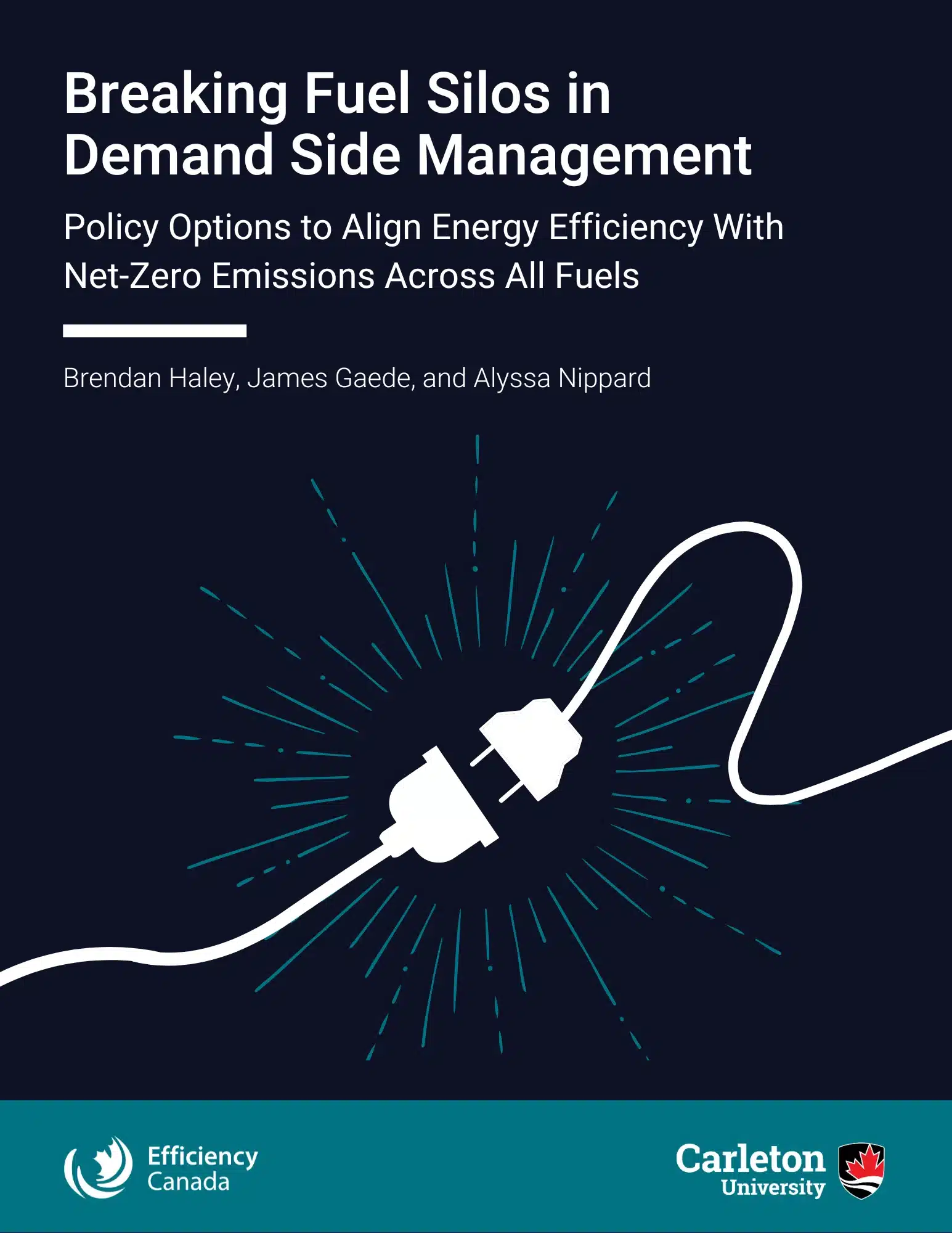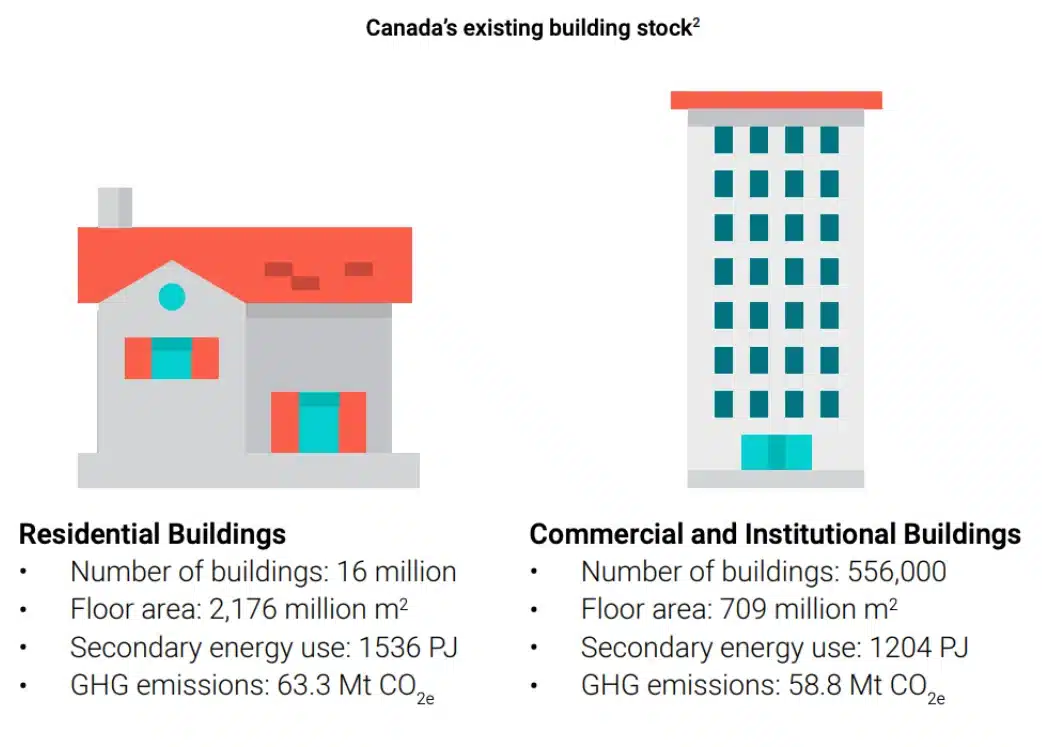NEW REPORT: How to Modernize Canada’s Energy Efficiency Act

We’re excited to share one of our latest reports, “How to Modernize Canada’s Energy Efficiency Act.”
Despite minor revisions in 2009 and 2017, the Act has not kept pace with today’s energy challenges. Our report offers ten actionable recommendations for the federal government to address climate change, improve affordability, and enhance health outcomes by modernizing appliance and equipment efficiency standards. By updating these regulations, we can facilitate the transition to heat pumps, phase out costly oil heating, and reduce electricity costs for consumers and utilities.
NEW REPORT: Policy Strategies to Support Innovation in New Housing Construction

Our new report titled “Policy Strategies to Support Innovation in New Housing Construction” explores how technological innovation and industrialization can address Canada’s housing crisis.
The report emphasizes the need for a new paradigm in housing construction, advocating for modernized building codes and enhanced collaboration among all levels of government to foster a supportive environment for innovation. By adopting advanced construction techniques, we can accelerate the delivery of affordable, high-quality, and climate-neutral housing. The report also outlines policy recommendations that link technological innovation with cohesive progress in standardization and building codes
NEW REPORT: Breaking Fuel Silos in Demand Side Management

Traditionally, demand side management (DSM) programs have been limited to natural gas and electricity, creating “fuel silos” that hinder energy efficiency efforts. This report highlights the importance of breaking down these silos to better integrate modern technologies like heat pumps and electric vehicles while addressing peak demand and affordability challenges. Key findings suggest that existing DSM infrastructure is well positioned to support electrification and cross-fuel efficiency, with policy recommendations including regulatory mandates and updated cost effectiveness testing.
Efficiency Canada Hosted the First Ever Home Energy Justice Conference
The inaugural Canada Home Energy Justice Conference brought together 164 professionals from diverse sectors to collaborate on advancing energy efficiency and equity across Canada. In the words of one attendee, we were very honored to bring together “multi-passionate, intelligent and caring professionals for a couple of days of pure magic.” Building on the success of this year’s event, we are excited to announce that the conference will return next year! We look forward to welcoming you to another impactful gathering of professionals and advocates driving positive change in our communities.
Accelerating the Energy Transition – Investing in People
In a recent interview with We Don’t Have Time, one of Efficiency Canada’s Regional Champions Mathieu Côte emphasized the importance of energy training and the need to build a robust energy workforce. He highlighted that as we move toward a more sustainable future, developing skills and knowledge in the energy sector is essential. Mathieu argued that the transition cannot happen without adequately trained professionals who can implement innovative energy solutions and technologies. He urged stakeholders across the energy sector to prioritize workforce development to ensure that we have the necessary talent to meet our energy goals and tackle the challenges ahead.
Watch his interview here
Leading the Way – How municipalities can leverage benchmarking to building labeling to decarbonize existing buildings

Efficiency Canada has published “Leading the Way – How Municipalities Can Leverage Benchmarking to Building Labeling to Decarbonize Existing Buildings,” highlighting the critical role municipalities play in reducing emissions from the building sector. Despite a decrease in emissions per unit floor area since 2000, overall emissions have risen due to increased building numbers. The post emphasizes the need for stringent standards for existing buildings, requiring low-energy retrofits to meet climate goals by 2030 and 2050. It discusses how benchmarking and building labeling initiatives can help municipalities identify performance gaps and enhance energy efficiency, with successful examples from cities like Montreal, Vancouver, and Toronto paving the way for a decarbonized building sector.
Let’s Make Eliminating Energy Poverty a National Priority
Efficiency Canada’s blog post, Let’s Make Eliminating Energy Poverty a National Priority, highlights the need for a national strategy to address energy poverty, which impacts over two million Canadian households. It calls for a common definition of energy poverty, regular measurement, and clear targets for elimination, drawing inspiration from the UK’s successful fuel poverty initiatives. With recent federal investments in energy efficiency for low-to-median income households, the post emphasizes the importance of coordinated efforts across all levels of government to ensure that every Canadian has access to affordable and reliable energy.
Read the full blog post here
Enhancing Energy Efficiency and Affordability in Canadian Homes
Last month, Natural Resources Canada announced a $4.3 million investment for five projects supporting deep energy retrofits, aimed at reducing greenhouse gas emissions in Canada’s buildings sector. Notable initiatives include EnviroCentre’s project in Gloucester’s Carver Place neighborhood, receiving over $2 million for social housing retrofits, and additional funding for projects in Atlantic Canada, Indigenous communities, and the creation of a National Retrofit Repository. These initiatives are designed to save costs for building owners while promoting sustainable practices.
Read more about it here
Second Call for Applications: Codes Acceleration Fund Now Open
The second call for applications for the Codes Acceleration Fund is now open. This initiative supports provinces, territories, municipalities, and Indigenous governments in decarbonizing the buildings sector through the adoption of newly published energy codes. The fund aims to accelerate the adoption of high-performance energy codes, promote compliance, and build market capacity for sustainable practices. Approximately $30 million is available until March 31, 2027, with applications open until January 10, 2025, and ongoing acceptance for Indigenous governments until March 31, 2025.
Read more about the Codes Acceleration Fund and how to apply here
New Economy Canada launches new campaign: Canada’s clean economy is hiring!
Most of these jobs are in industries that have been around for decades — at mines, construction sites, steel plants, pulp mills and manufacturing facilities. These industries have been the backbone of Canada’s economy, and now they’re modernizing and reducing carbon pollution, using clean energy and tech. There are new jobs too. Jobs in electric vehicle and charging station manufacturing. Jobs in solar panel installation. Jobs in evolving sectors like nuclear. And, jobs in emerging sectors like hydrogen.
Find out more about opportunities in the clean economy here.
Ontario’s Commitment to Affordable Energy Amid Growing Demand
The Ontario government has unveiled Ontario’s Affordable Energy Future: The Pressing Case for More Power, outlining strategies to address the province’s rapidly increasing energy demand, projected to rise by 75% by 2050. The government plans to expand non-emitting nuclear energy while rejecting a carbon tax. Other key initiatives include launching extensive energy efficiency programs in 2025, engaging the public and Indigenous communities in consultations, and advancing infrastructure projects to support energy needs and economic growth.
Read more here
Sustainable Buildings Canada Chosen to Lead Sustainability Program
Sustainable Buildings Canada (SBC) has been selected by Natural Resources Canada (NRCan) to lead a significant national and provincial sustainability program. This initiative aims to advance sustainable building practices across Canada, promoting energy efficiency and environmental stewardship in the construction and renovation of buildings.
Read more about it here
FortisBC Doubles Funding for Revamped New Home Program
FortisBC has announced a significant revamp of its New Home Program, doubling the funding available to builders in British Columbia to promote energy-efficient construction. Rebates have increased to $15,000 for homes achieving Step 4 and $20,000 for net-zero-ready homes (Step 5) under the BC Energy Step Code. This initiative aims to support the growing population and meet climate action goals by providing builders with flexibility in their construction approaches, based on insights from diverse climate zones across the province. FortisBC emphasizes a whole-home approach to energy efficiency, encouraging collaboration with energy advisors and funding for various energy-efficient measures and appliances.
Read more here
